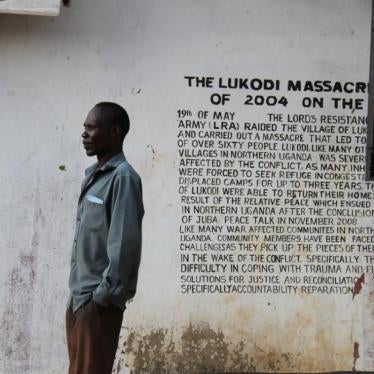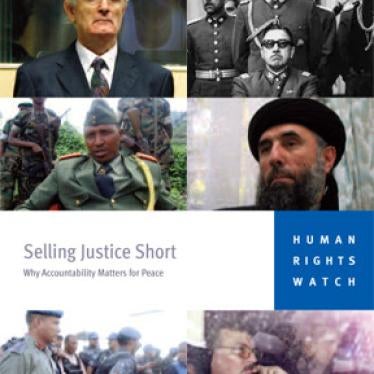Human Rights Watch believes the annual Assembly of States Parties (ASP) session is an important forum for states parties to the Rome Statute of the International Criminal Court (ICC) to become involved in substantive aspects of the ICC's policy and practice, while respecting the court's independence. An engaged ASP is crucial both for the assembly to exercise its functions under the Rome Statute properly and to ensure that the ICC becomes an effective institution.
It is our view that the fifth session of the ASP was largely successful. The atmosphere was more positive and the debates more substantive and inclusive than in previous years. As a result, the ASP made appropriate decisions on key issues, such as funding for outreach and victim and witness protection.
The points we wish to highlight fall into three categories:
I. A More Substantive ASP Session
We were pleased that states parties used this session as an opportunity to discuss substantive aspects of the ICC's work. Human Rights Watch believes that these discussions increase states parties' engagement in and understanding of the ICC's operations and challenges. This in turn allows states parties to assist in the development of the institution more effectively.
The general debate provided an opportunity for many states parties to express their commitment to the ICC and to give their perspective on current ICC issues. We believe that this segment helped create an appropriate framework for the meetings that followed. Court officials also informed us that they found the general debate very valuable as it provided them with a better understanding of how their work is perceived by states parties.
A wide range of issues were addressed during this session:
- Strategic Plan: The ICC's first Strategic Plan, which identifies the court's common goals and its plans to achieve them, sparked interesting discussion about the importance of increasing the impact of the court in situation countries, including by organizing in situ proceedings.
- Impact of the court: The need for the ICC to have an impact on the populations most affected by the crimes it investigates permeated several discussions, particularly in relation to the budget (outreach and witness protection) and the Strategic Plan.
- Outreach: We were also pleased that states parties demonstrated their continuing commitment to outreach by discussing its significance at length, including during a lively and well-attended lunch meeting dedicated to the issue.
- Cooperation: As the court progresses in its work, the need for cooperation is becoming increasingly acute and relevant to all parties to the Rome Statute. States parties gave prominence to this issue during this session. In addition to discussing cooperation in the abstract, states parties participated in a separate meeting with the Office of the Prosecutor and established a bureau working group on this matter.
- Peace and Justice: Reflecting on the current situations before the court, numerous states parties emphasized that peace and justice must be seen as complementary, and not contradictory, objectives.
II. A Better Organized ASP Session
•The longer session facilitated greater participation by delegations: For the first time, no concurrent meetings took place during the session. As a result, smaller delegations were able to follow all the discussions and be more actively involved in the decision-making process. The atmosphere between delegations improved as a result and was characterized by a spirit of "camaraderie."
- Changes in the structure of informal sessions were beneficial: We appreciated the fact that informal working group sessions were open to non-governmental organizations this year. Additionally, making interpretation available during these informal sessions allowed non-English speaking delegations to participate more fully in the informal discussions.
- The contribution of the bureau working groups and facilitators cannot be overstated: The groundwork done by the working groups (who met regularly throughout the year in The Hague and New York) greatly facilitated the decision-making process during the session.
III. A Renewed ICC Spirit
The passage of time has naturally led to the loss of the "Rome Generation." Human Rights Watch has been concerned that discussions about the ICC's work were becoming mired in minutiae and losing sight of the "big picture" and general mission for which the ICC was established. We were therefore pleased that this ASP session confirmed the emergence of a "new generation" of diplomats dedicated and knowledgeable about the ICC. This commitment was demonstrated both by the dedication of more time to in-depth discussions and by the more substantive nature of the discussions themselves. We were also particularly pleased by the active engagement of the Democratic Republic of the Congo and Uganda on whose territory ICC investigations are ongoing.
Human Rights Watch believes that committed diplomats taking the time to highlight and discuss substantive issues in-depth led in turn to well-considered decisions that will have a positive impact on the functioning of the court.
Specifically, we were pleased that, in the context of the budget approval process, attention was paid to the key areas of outreach and victim and witness protection.
We hope that the positive developments seen during the fifth session of the Assembly of States Parties marks a transition toward a lasting, more productive relationship between the states parties and the ICC. We look forward to continuing our work with the bureau and its working groups throughout the year and to the next session of the ASP in New York.






